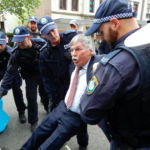The Rights of the Elderly Are Ignored in Australia

Australian places of detention will soon come under much greater scrutiny, as local independent oversight bodies will begin randomly inspecting these facilities, with the aim of upholding the human rights of detainees.
Inspectors will operate under the provisions of the Optional Protocol to the Convention Against Torture (OPCAT), which builds upon the UN Convention Against Torture. And where the OPCAT differs from what’s come before it, is that it has a focus on preventing abuse before it happens.
The Australian government signed the OPCAT in 2009. Although, it didn’t ratify the agreement – which obligates its establishment – until December 2017. And it was the fallout from the July 2016 Don Dale torture revelations that led then attorney general George Brandis to formally consent to it.
The OPCAT allows three years for its commencement once ratified, so next year will see the roll out of the National Preventive Mechanism (NPM), which is a network of independent watchdog teams, under the coordination of the Commonwealth Ombudsman.
However, as two UN bodies are set to visit Australia next month in preparation for the launch, there’s been concerns raised around the government’s refusal to allow OPCAT inspectors into aged care facilities, especially in light of the mistreatment being exposed by the Royal Commission.
Opening up closed environments
“The visit demonstrates to the international community – in the words of former minister for foreign affairs Julie Bishop – ‘Australia’s unwavering commitment to international scrutiny and accountability,’” said Australia OPCAT Network coordinator Steven Caruana.
“This is significant because Australia has in the recent past been viewed to be critical of UN mechanisms,” he told Sydney Criminal Lawyers.
Next month’s visit will involve the UN Subcommittee on the Prevention of Torture (SPT) and the UN Working Group on Arbitrary Detention (WGAD). And with the NPM roll out, the SPT will also be charged with conducting its own random inspections of facilities and then reporting to government.
Mr Caruana outlined that the visit is of “both practical and symbolic significance”. Firstly, the government, in inviting the UN, is showing a willingness to adhere to outside scrutiny. And it enables the bodies to inspect closed environments: both those subject to the NPM and those that won’t be.
“The SPT is primarily concerned with how places of deprivation function, the treatment of detainees and the oversight within them,” Caruana explained. “The WGAD is concerned with how people ended up there in the first place”, and the process that led to their deprivation of liberty.
Greater Transparency
The Australia OPCAT Network consists of NGOs, academics, and statutory and oversight agencies. It’s recently released the Implementation of OPCAT in Australia submission, which is designed to inform the SPT and the WGAD during their visit.
One of the lead authors of the report, Mr Caruana explained that it “highlights the current progress of implementing Australia’s NPM”, and it looks at the numerous forms of deprivation of liberty in this country, including a section on aged care facilities.
Regarding immigration detention, the submission points to increasing levels of systemic cruelty within the system, along with a lack of transparency around it. However, the NPM will not apply to offshore detention centres in Nauru or Papua New Guinea.
And the document also takes aim at the incarceration of First Nations people. It sets out that despite making up a little over 2 percent of the population, Indigenous inmates constitute 28 percent of those in correctional facilities. And within them, they suffer a lack of care, abuse and racism.
“A shocking tale of neglect”
“There are currently 90 countries that have ratified OPCAT and no other country has limited the scope of the NPM as Australia has in focusing initially only on ‘primary places of detention,’” Caruana went on, adding that “excluding aged care facilities is especially troubling”.
The often-overlooked Royal Commission into Aged Care Quality and Safety has uncovered numerous cases of “outright abuse” and mistreatment within the walls of these closed environments. Indeed, its interim report reveals an understaffed system, with a lack of care given towards our elderly.
“The neglect that we have found in this Royal Commission, to date, is far from the best that can be done,” the commissioners said in a press release last October. “Rather, it is a sad and shocking system that diminishes Australia as a nation.”
The Morrison government revealed late last year in response to questions on notice that it will be allowing the NPM to operate in “places of detention”, which it doesn’t consider includes aged care facilities. And it asserts that this is in accordance with article 4 of the OPCAT.
Although, as Caruana maintains, these facilities do fall within the OPCAT mandate, as article 4 states the NPM should operate in “any place” under a state’s “jurisdiction and control where persons are or may be deprived of their liberty”.
Out of sight, out of mind
“The Australia OPCAT Network’s submission demonstrates that this limiting scope goes against the grain of OPCAT’s intention,” Caruana makes clear. And the Churchill fellow further explained that the network has “put forward a convincing argument” that aged care facilities should be involved.
Caruana visited European countries and New Zealand a few years back to witness firsthand how OPCAT is operating. And he says that rather than being a genuine reading of the treaty, the government’s interpretation is a “wilful departure” from what’s happening overseas.
The Aged Care Royal Commission was sparked by a report into the mistreatment occurring at the now defunct Oakden aged facility in SA. The report author, former SA chief psychiatrist Dr Aaron Groves, has stated that the horrors in that case could never have happened with the NPM in place.
With the commission, “continuing to uncover serious mistreatment it would only be sensible to ensure an independent rights-based, preventive oversight mechanism, like OPCAT, be used to safeguard our vulnerable elderly community”, Mr Caruana concluded.







